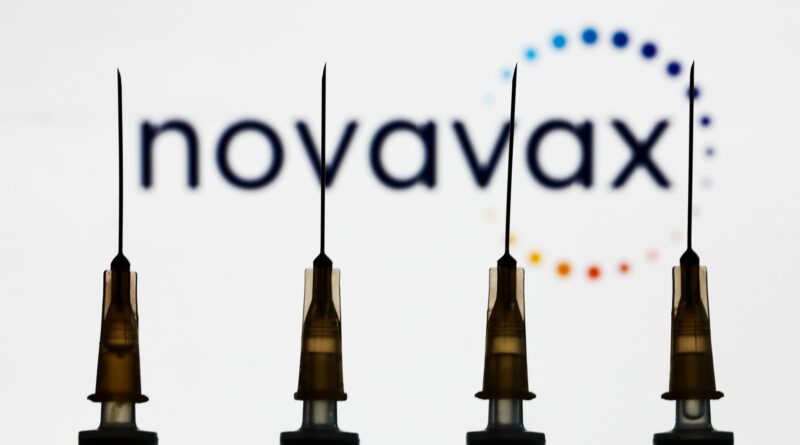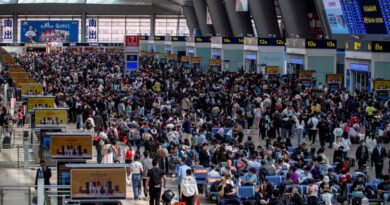Covid vaccine maker Novavax sees a pathway to survival – but it won’t be easy
[ad_1]
Medical syringes and Novavax logo displayed in the background are seen in this illustration photo taken in Krakow, Poland on December 2, 2021.
Jakub Porzycki | NurPhoto | Getty Images
Novavax has a clear message for Wall Street: The cash-strapped Covid vaccine maker sees a pathway to survival.
Maryland-based Novavax said as much last month when it reported its first-quarter financial results and unveiled a broad cost-cutting push along with a higher-than-expected 2023 revenue forecast of $1.4 billion to $1.6 billion. That report stood in stark contrast to the previous quarter, when the biotech company raised doubts about its ability to stay in business.
But Wall Street hasn’t entirely bought into the recovery plan: Shares of Novavax are still down roughly 25% since the start of the year after shedding more than 90% of their value in 2022.
And staying afloat through 2023 and beyond may not be an easy task.
The 36-year-old company will continue to rely on its protein-based Covid vaccine – its only commercially available product – for most of its revenue this year.
Covid shot sales will largely depend on Novavax’s ability to deliver an updated version of its jab in time for the fall, when the U.S. government is expected to shift vaccine distribution to the private sector. Even if Novavax can meet that timeline, it will face tough competition from mRNA rivals Pfizer and Moderna.
Wall Street is also waiting to see how Novavax will execute its cost reduction plan, and how a pending $700 million arbitration over a canceled vaccine purchase agreement could play out.
The company will need to juggle those near-term challenges before it can sharpen its focus on its promising vaccine pipeline, which includes a combination shot targeting Covid and the flu, a stand-alone flu vaccine and a new high-dose Covid shot.
“The next six to nine months are going to be a really critical period for the company,” Cowen analyst Brendan Smith told CNBC.
Competing in the commercial market
Novavax, now led by a new CEO, John Jacobs, was an early front-runner in the Covid vaccine race, but the company’s two-shot regimen won U.S. approval under emergency use just last year due to regulatory and manufacturing delays.
Now, Novavax’s biggest priorities are to manufacture an updated Covid shot by the fall and to capture commercial market share after lagging so far behind Pfizer and Moderna. Some analysts believe the company has a reasonable chance of doing so, but note that competition with the two mRNA giants could remain a challenge.
“Given [Novavax’s] financial situation, they really need to be able to bring in some commercial sales this coming fall and winter,” Smith said. “That will ensure they remain a viable entity in future cycles as well.”
Once the U.S. government’s supply of free Covid vaccines runs out, all three companies will sell updated shots directly to health-care providers.
Those shots will target a variant of the virus — selected by a panel of advisors to the Food and Drug Administration on Thursday — that’s expected to circulate most prominently this fall and winter.
Novavax is giving itself a “head start” on developing that updated shot because the company’s protein-based vaccine takes longer to develop and manufacture – around three to six months in total – than its messenger RNA counterparts, said Silvia Taylor, executive vice president at the drugmaker.
Analysts estimate it typically takes closer to six months to deliver a protein-based vaccine and three months to produce an mRNA shot.
Novavax is working closely with global regulators on strain selection guidance to start development as early as possible. Taylor added that Novavax is already developing shots that target different strains, including the omicron subvariant XBB.1.5, the dominant strain of the virus globally.
The World Health Organization last month recommended that new Covid shots target XBB variants, which Taylor called “extremely encouraging” guidance ahead of the FDA panel meeting.
Jefferies analyst Roger Song said he expects Novavax to be able to deliver its updated vaccine in time for the fall if the FDA advisors select a strain “within the current library” the company has been evaluating. It’s unlikely that the advisors will choose a completely new strain, he noted.
A health worker prepares a dose of the Novavax vaccine as the Dutch Health Service Organization starts with the Novavax vaccination program on March 21, 2022 in The Hague, Netherlands.
Patrick Van Katwijk | Getty Images
Another upside for Novavax could be its use of protein-based technology, a decades-old method for fighting viruses used in routine vaccinations against hepatitis B and shingles.
Novavax’s shot works differently than Pfizer’s and Moderna’s mRNA vaccines, but achieves the same outcome: teaching your body how to fight Covid.
B. Riley Securities analyst Mayank Mamtani said Novavax could leverage the unique advantages of the company’s protein-based platform as part of its commercial marketing efforts.
“They have a theoretically compelling message that says, let’s try something new,” Mamtani told CNBC. “Let’s try a new vaccine that, in some cases, won’t make you miss work due to chills, a fever or other side effects you could have with mRNA.”
Clinical trial data on Novavax’s vaccine suggests it is less likely to cause side effects compared with Pfizer’s and Moderna’s shots. Data also indicates that it has a similarly high rate of efficacy – around 90% – as that of its mRNA rivals.
Still, Smith noted, the company will have to compete with the “enormous name-brand recognition” of Pfizer and Moderna, which have dominated the U.S. Covid vaccine market since the FDA approved their shots for emergency use in late 2020.
The U.S. has administered more than 360 million vaccines and boosters from Pfizer and over 230 million from Moderna, according to the Centers for Disease Control and Prevention. Novavax’s late entrance into the game has led to significantly lower uptake: The U.S. has administered just under 90,000 shots from the company.
Novavax will also have to compete at a time of “record low public interest” in getting Covid booster shots, Smith added.
According to the CDC, only about 17% of the U.S. population has gotten Pfizer’s and Moderna’s bivalent omicron boosters, which have been available since September.
“There’s still a number of headwinds kind of working against [Novavax,]” Smith said, adding that cost-cutting efforts could potentially hinder the company’s ability to compete in the commercial Covid vaccine market this fall.
Novavax is pulling back spending at the same time it needs to ramp up its commercial sales team, making the timing “unfortunate in a much more broader context,” he said.
Cost-cutting plan
Novavax is working to drastically cut costs, with plans that involve slashing roughly 25% of its global workforce. The company had just under 2,000 employees as of late February.
The drugmaker will also consolidate its facilities and infrastructure. Those moves are intended to reduce the company’s 2023 research and development expenses as well as selling, general and administrative costs, which together amounted to around $1.7 billion last year.
Novavax expects the cost-cutting plan to reduce that figure by approximately 20% to 25% this year and by 40% to 50% by 2024.
Jefferies’ Song said he is most focused on the 2024 cost reduction goal but noted the company needs to be careful about how much it decides to slash costs.
“I hope that they can cut a little bit faster and bigger,” Song told CNBC. “But they also don’t want to overshoot what they need to cut and jeopardize their capabilities.”
But Taylor emphasized that the plan will help Novavax refocus on its top priority: delivering an updated vaccine in the coming months.
“We feel like we’re in a good place in terms of operating with a relentless focus on our priorities and operating in a more efficient manner in order to be able to meet our objective of making our vaccine available for the season,” she told CNBC.
Gavi arbitration
And, looming overhead is a pending $700 million arbitration related to Gavi, a nongovernmental global vaccine organization.
Last year, Novavax terminated a Covid shot purchase agreement with Geneva-based Gavi, citing Gavi’s failure to procure the 350 million vaccine doses it agreed to buy in May 2021 on behalf of the COVAX Facility — a global program that aims to distribute Covid vaccines more equitably in lower-income countries.
As part of the agreement with Gavi, Novavax said it received nonrefundable advance payments amounting to nearly $700 million.
Gavi is now trying to recoup those prepayments. The organization argued in a Reuters interview last year that Novavax breached the agreement and failed to provide COVAX with vaccines from contractually specified locations.
An elderly woman receives a dose of Covid-19 vaccine at a clinic on Dec. 12, 2022 in Hohhot, Inner Mongolia Autonomous Region of China.
Ding Genhou | Visual China Group | Getty Images
Song called the Gavi arbitration the biggest uncertainty around Novavax. He said the company “may be in trouble” if it has to return the full $700 million to Gavi this year.
But he said there’s a good chance Novavax and Gavi will settle the arbitration on middle ground. That could involve Novavax repaying less than the full amount or establishing a repayment plan through 2024, Song added.
Cowen’s Smith said, “If there’s one thing the market tends to dislike, it’s uncertainty.”
“We don’t know how the arbitration is going to play out or the timing of it, so that’s why I continue to categorize this as a major overhang for the stock,” Smith added.
Novavax’s Taylor declined to comment on the state of the ongoing arbitration, but said “we feel pretty good about our position.”
“We’ll know soon enough what happens with that,” she added.
[ad_2]
Source link

